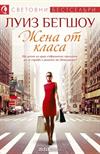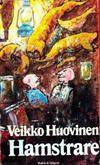
Suite Francaise
Registered by jmutford of Yellowknife, Northwest Territories Canada on 8/26/2008
 This Book is Currently in the Wild!
This Book is Currently in the Wild!
 This Book is Currently in the Wild!
This Book is Currently in the Wild!
1 journaler for this copy...
Journal Entry 1 by jmutford from Yellowknife, Northwest Territories Canada on Tuesday, August 26, 2008
(I reviewed this one, as I read it, on The Book Mine Set (http://www.bookmineset.blogspot.com) a while ago. Here are my thoughts from that reading.)
I have to admit, when my bookclub voted on Suite Francaise by Irene Nemirovsky, I thought I was surrounded by a bunch of pretentious snobs. If they are, this book was not the proof I was looking for.
I also have to admit, I hadn't heard of it. In hindsight, that would explain my ignorant thoughts. So when I got home, I wikipedia'd (have we made that a verb yet?)Irene Nemirovsky. If the author's own life, including the time when she wrote the novel, is any indication, the book should be interesting.
So far, it is. Apparently, Nemirovsky set out to write a 20th century version of War and Peace. Certainly, there are similarities. Switching back and forth between characters, focusing on society's layers (class, religion, even different occupations) it seems as if she was trying to touch upon all the varieties of people that would be affected by the War (i.e., World War II). The war itself, and the exodus of characters from Paris, again is reminiscent of Tolstoy's classic. It's been a while since I read War and Peace, but I do remember that, while liking the book, I was overwhelmed with the number of characters. I've heard a few people say that they found that to be the case here as well, but so far I've been able to keep track. However, I am only 50 pages in...
One of the more compelling facets of the book is the tragic irony. As in Kevin Major's No Man's Land, the outcome is known by the reader. As I read Major's book about Newfoundlanders fighting in France during World War I, I remember wishing I could have read about the French people themselves, to get their perspective in the whole tragedy. While this is a different war, I'm finally getting to see those whose country is being torn apart. In that essence, it's a little more like Ordeal in Cambodia. In that book, while escaping the Khmer Rouge, Vek Huong Taing and his wife were strengthened in their identity (Christians) while in Suite Francaise there are already signs of people shedding their former identities as they are coming to realize they had been defining themselves by material possessions. A contrast yes, but both fascinating, and I'm sure accurate possibilities of the effect of war and of forced exodus on individual people. In both cases, (arguably) people keep their good traits and discard the bad ones in time of crisis. However, I'm sure that a person's personality can change for the worse as well- extreme cynicism, despair, and so on. I haven't encountered that in Nemirovsky's novel yet, but with such an array of characters I hope I do. Not that I have a sadistic desire to see people suffer, I just think some representation of the darker side of the effect of war might be necessary- like that of Elijah in Joseph Boyden's Three Day Road, only with civilians rather than soldiers.
...
In my first post about this book I mentioned that people were shedding their former selves by abandoning their material possessions and realizing what was truly important. That wasn't the case for everyone. Some characters had done the opposite. In the last moments before leaving, some took precious time to hide valuables in nooks and crannies, or else try to stash them in already crammed suitcases and cars.
I remembered this contrast and bring it up now because such differences have become my focus in the book. I love the different traits and personalities explored by Nemirovsky. How easy is it to group victims together as one homogeneous group? Yet it seems to have been one of Nemirovsky's goals to remind readers that this was not the case. In one of the most intense illustrations of contrasts, she writes,
"Panic-stricken, some of the women threw down their babies as if they were cumbersome packages and ran. Others grabbed their children and held them so tightly they seemed to want to force them back into the womb, as if that were the only truly safe place."
Wow.
...
There is one thing that puzzles me about this book and Nemirovsky's intentions. When I think of WWII, the Jews are forever linked to that part of history. To me, the horror they went through is what defines the War. Yet, oddly there has been almost no mention of them. When any character's faith has been mentioned, it's been Catholic. I'm two thirds of the way through and the only reference to the Jews has been a single paragraph describing how some of the posters the Germans had put up around France showed caricatures of Jews and Englishmen. I realize that Nemirovsky was focussing on how the War affected specific individuals, but I wonder why she didn't write about a Jewish character. Did the plight of the Jews really seem so insignificant? Was that her point?
What makes the notable absence of Jews even more surprising is that Nemirosky herself was Jewish. She'd eventually be captured at die at a concentration camp. Another theory is that maybe she didn't want to face her worst fears, and Suite Francaise, with its bleakness, was all the escapism she could muster in such a troubled time.
...
Nemirovsky never did get around to including the plight of the Jewish people in her unfinished work, Suite Francaise. And while the key might be in the "unfinished", the two appendices at the end might give further clues. Here we discover that Nemirovsky had converted to Catholicism once she immigrated to France (a fact considered irrelevant by the Nazis). Still, the lack of any discussion of Jewish people by any of the characters seems a bit odd to me. Instead, Nemirovsky seems to focus on the differences between castes. Reading Nemirovsky's notes about her work, it seems to have been an overt decision to make that a focus, while also choosing to show an almost indifference to the events of the war itself. Still, while an expose on upperclasses appalled by the boorishness of the lowerclasses, and the lowerclasses appalled by the greed and shallowness of the upperclasses, presents an interesting take on war, not mentioning the Jews for this particular War is astounding. Sadly, Nemirovsky's own life provides the missing element- a remarkable but sad substitute for the ending she was never able to provide through fiction.
Journal Entry 2 by jmutford at Public Health in Yellowknife, Northwest Territories Canada on Tuesday, August 26, 2008
Released 15 yrs ago (8/26/2008 UTC) at Public Health in Yellowknife, Northwest Territories Canada
WILD RELEASE NOTES:
WILD RELEASE NOTES:
This was a pick for a book club in Iqaluit. I enjoyed it, hope you do too.
This was a pick for a book club in Iqaluit. I enjoyed it, hope you do too.



